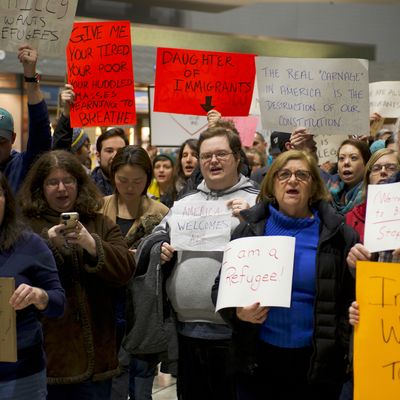
After the Supreme Court finally handed President Trump a victory in the long legal battle over his attempt to ban people from six Muslim-majority nations, and all refugees, from entering the United States, he issued a celebratory statement. It read, in part:
As President, I cannot allow people into our country who want to do us harm. I want people who can love the United States and all of its citizens, and who will be hardworking and productive.
My number one responsibility as Commander in Chief is to keep the American people safe. Today’s ruling allows me to use an important tool for protecting our Nation’s homeland.
Presumably, the Trump administration couldn’t botch the rollout of the new travel ban as badly as it did in January. Despite what Trump claimed, the Supreme Court did not give him a “clear victory.” The justices said the revised version of the travel ban can be enforced while we await their ruling on its constitutionality in the fall. And the Supreme Court placed significant limits on the Trump administration: For the next few months, it can only ban “foreign nationals who lack any bona fide relationship with a person or entity in the United States.” Current visa holders, students, foreigners hired to work in the U.S., and people with relatives in the U.S. are not affected.
The Supreme Court offered some examples of who meets the “bona fide relationship” standard:
For individuals, a close familial relationship is required. A foreign national who wishes to enter the United States to live with or visit a family member, like Doe’s wife or Dr. Elshikh’s mother-in-law, clearly has such a relationship. As for entities, the relationship must be formal, documented, and formed in the ordinary course, rather than for the purpose of evading EO–2. The students from the designated countries who have been admit- ted to the University of Hawaii have such a relationship with an American entity. So too would a worker who accepted an offer of employment from an American company or a lecturer invited to address an American audience. Not so someone who enters into a relationship simply to avoid §2(c): For example, a nonprofit group devoted to immigration issues may not contact foreign nationals from the designated countries, add them to client lists, and then secure their entry by claiming injury from their exclusion.
Of course, the Trump administration managed to stir controversy anyway. The AP reports that a cable sent to U.S. embassies and consulates on Wednesday night explained the new criteria for visa applicants, which takes effect Thursday at 8 p.m. ET. The guidelines say new applicants from six Muslim-majority nations — Syria, Sudan, Somalia, Libya, Iran, and Yemen — must prove that they have a relationship with a parent, spouse, child, adult son or daughter, son-in-law, daughter-in-law, or sibling already in the U.S. However, grandparents, grandchildren, aunts, uncles, nieces, nephews, cousins, brothers- and sisters-in-law, fiancés, and other extended family members don’t count as “close” family relationships.
The guidelines list plenty of other exceptions for people from the six nations affected by the ban. Journalists, students, and people who have employment contracts with American companies could enter the country. And there are other signs that the Trump administration has recognized that keeping out foreign artists, children, and sick people is a bad PR move. Per the AP:
Consular officers may grant other exemptions to applicants from the six nations if they have “previously established significant contacts with the United States;” ”significant business or professional obligations” in the U.S.; if they are an infant, adopted child or in need of urgent medical care; if they are traveling for business with a recognized international organization or the U.S. government or if they are a legal resident of Canada who applies for a visa in Canada, according to the cable.
But, for some reason, the Trump administration is setting itself up to have images of an elderly Libyan woman separated from her grandchildren in the U.S. plastered on the front page of every newspaper.
In the administration’s defense, this is partly the Supreme Court’s fault. In his dissent, Justice Clarence Thomas said he worried that the ruling would “prove unworkable” and predicted a “flood of litigation.” He explained, “Today’s compromise will burden executive officials with the task of deciding — on peril of contempt — whether individuals from the six affected nations who wish to enter the United States have a sufficient connection to a person or entity in this country.”
Even if special treatment for son-in-laws wasn’t one of Trump’s core beliefs, he could not ban them when the court specifically said a mother-in-law should be allowed in. Treating grandparents and aunts differently doesn’t make any sense, but neither does banning people from six nations that aren’t linked to any of the fatal terror attacks on U.S. soil while cozying up to Saudi Arabia, home to many of the 9/11 attackers.






























